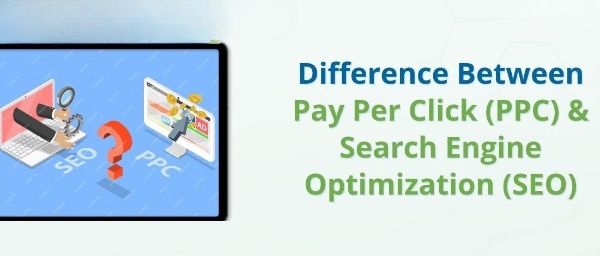Search Engine Optimization, or SEO for short, and Pay-Per-Click advertising, or PPC for brevity, are two of the most popular and widely used techniques that come under the category of digital marketing. Both methods have the sole objective of increasing the ranking of websites on the internet and sending a better extent of traffic to such websites. However, both are good methods that work on the premises that are entirely different from each other and are modified to meet different purposes and financial strategies. Knowing the essential differences between both the methods is necessary for the proper development of a potent and successful digital marketing method.

1. Definition and Approach
SEO is the process of optimizing a website to rank higher organically on search engine results pages (SERPs) without paying for ad placement. It is an optimization process of all aspects of a website—content, technical setup, and backlinks—to match search engine algorithms. The quality of the SEO of a website, the higher its chances of showing up on the first page of search results for related queries.
PPC advertising, however, entails the payment of money for placing ads on Search Engine Results Pages (SERPs) or other online platforms. Advertisers bid on certain keywords, and their ads appear when users search for those keywords. The advertiser pays a fee each time a user clicks on their ad, hence the name "pay-per-click."
2. Cost Structure
SEO is really an effort and time investment. Although you can choose to outsource SEO professionals or purchase performance analysis tools, there is no upfront cost to becoming visible in organic search. It's a long process that needs frequent updates and maintenance, given the frequency of changes in search algorithms.
PPC involves a direct financial investment. It implies you are spending a budget on your campaigns, placing bids on keywords, and keeping aside money to pay for each click. The cost can be significantly different depending on how competitive the keywords are. For instance, in fields like legal or insurance, keywords can be fairly expensive.
3. Speed and Results
SEO usually takes time to yield returns. Weeks or months may pass before you notice improvement in rankings after you optimize your site. But once in place, SEO can deliver consistent and stable traffic without requiring frequent financial outlay.
PPC, however, provides instant results. As soon as you start a campaign, your ad can be displayed in search results. This makes PPC a good option for companies that need to be seen instantly or promoting time-sensitive promotions.
4. Visibility in SERPs
With SEO, high visibility in organic search results is not something that comes easily and has to be maintained continuously. Organic results may not always be as flashy as pay-per-click advertising, but they are more trusted by users.
PPC ads appear at the top of search pages or highly visible in numerous digital spaces, often branded as "Sponsored" or "Ad." While this provides high visibility, it also requires a regular financial investment to continue.
5. Long-Term vs Short-Term Value
SEO is a long-term process. Once your site is well-ranked organically, it can keep sending traffic without incurring extra expense. The content and optimizations you do today can pay off for your site for years to come.
PPC advertising is essentially short-term oriented. When you stop sponsoring a PPC campaign, the ads disappear, so does the traffic they were previously creating. Though PPC works when used for short-term promotions, it is not stable enough to work as a long-term plan in itself.
6. Audience Targeting
PPC provides the benefit of precise targeting. PPC enables you to target your audience based on location, demographic, time of day, and even behavior. The specificity enables advertisers to target extremely niche audiences, which makes it easier to customize campaigns.
SEO, though strong in creating organic traffic, has less authority in targeting the audience. It relies on the keywords people search for and the algorithms that place your site as relevant to such searches.
7. Credibility and Trust
Organic search results, gained through SEO, are likely to be perceived as more authentic. Users are likely to believe that an organically listed website has reached the position through merit, based on its quality and relevance.
PPC ads, though visually compelling and highly advertised, carry the stigma of paid advertising. This can cause some users to have less faith in them than in organic results.
Conclusion
Both SEO and PPC advertising have their strengths and limitations. SEO is an inexpensive, long-term solution that establishes credibility and generates sustainable traffic. It takes patience and steady effort. PPC, by contrast, is a short-term approach that generates immediate results and facilitates targeted precision, but it is accompanied by recurring expenses.
A choice between the two—or how to incorporate both—is determined by your business goals, budget, and ROI timeline. A combination of both is often best, where PPC is used to create short-term gratification and solid SEO to create long-term success.

